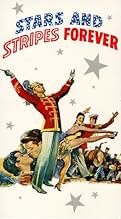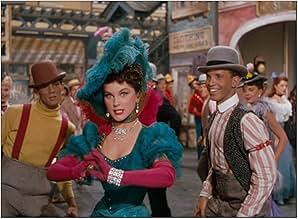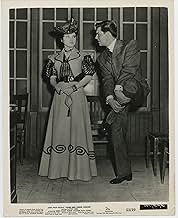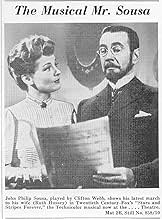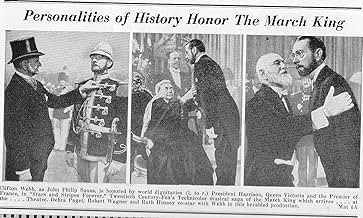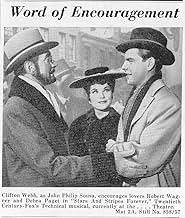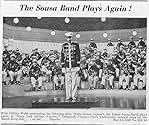VALUTAZIONE IMDb
7,1/10
994
LA TUA VALUTAZIONE
Aggiungi una trama nella tua linguaA film biography of the composer John Philip Sousa, from his early days in the Marine Corps Band through the Spanish-American War in 1898.A film biography of the composer John Philip Sousa, from his early days in the Marine Corps Band through the Spanish-American War in 1898.A film biography of the composer John Philip Sousa, from his early days in the Marine Corps Band through the Spanish-American War in 1898.
- Premi
- 3 candidature
Thomas Browne Henry
- David Blakely
- (as Tom Browne Henry)
Frank Ferguson
- Mr. Wells
- (scene tagliate)
Aladdin
- Orchestra Conductor
- (non citato nei titoli originali)
- …
Bill Alcorn
- Specialty Dancer
- (non citato nei titoli originali)
Sharon Jan Altman
- Helen Sousa
- (non citato nei titoli originali)
Jon Andrews
- Minor Role
- (non citato nei titoli originali)
John Baer
- Chorus Boy at 'El Capitan' Rehearsal
- (non citato nei titoli originali)
Barbara Bailey
- Dancer
- (non citato nei titoli originali)
Patricia Barker
- Minor Role
- (non citato nei titoli originali)
Alvin Beam
- Minor Role
- (non citato nei titoli originali)
Bobker Ben Ali
- Reporter
- (non citato nei titoli originali)
Trama
Lo sapevi?
- QuizAccording to Paul Bierley's biography of John Philip Sousa, "John Philip Sousa, American Phenomenon", several musicians who had played under Sousa attended the world premiere of the film but walked out in disgust.
- BlooperIn the film the famous Sousaphone was invented by Willy Little. In actuality the first sousaphone was developed by James Welsh Pepper in 1893 at the request of John Philip Sousa.
- Citazioni
John Philip Sousa: What in the name of all get out's been keeping you so long?
Jennie Sousa: I was hearing the children's prayers.
John Philip Sousa: Does that take all night?
Jennie Sousa: They were praying for you.
- Curiosità sui creditiDuring the opening display of 20th Century Fox's logo, Sousa's "Semper Fidelis" was played instead of the usual 20th Century fanfare
- Versioni alternativeSome releases include at the end a clip of the real John Philip Sousa leading the band in one of his famous marches.
- ConnessioniFeatured in Family Classics: Family Classics: Stars and Stripes Forever (1963)
- Colonne sonoreSemper Fidelis
(uncredited)
Music by John Philip Sousa (1888)
Played during the opening credits
Also played by the Marine band at the presidential reception
Recensione in evidenza
Watch this movie to get a historical perspective on some of America's and the World's Best Marching Band Music by John Philip Sousa!
The film is a chronology of snippets about the life of John Philip Sousa, his wife, and two apparently fictional friends written into the movie to have a young romantic sub-plot. All other performers in this film are not interesting enough in character to comment upon. Most of the actors were not even credited in the films running credits.
Clifton Webb (real name: Webb Parmalee Hollenbeck) was 63 years old when this movie was released in 1952. While his written dialog is not all that dramatic, Mr. Webb was a long time actor, singer, dancer, silent screen performer and theater performer before making this picture. Clifton Webb doesn't really have to act in this film. He carries the part of John Philip Sousa by standing straight with a stiff back, wearing many colorful marching band uniforms, looking very snobbishly "British" with a stiff demeanor while putting on the airs of a musical task-master demanding perfection, yet with a silent softness in his heart for the two younger performers, a 22 year old Robert (John) Wagner and the vivacious, effervescent, and energetic 18 year old Debra Paget (real name: Debralee Griffin). Mr. Webb died in 1966 at the age of 77 years old.
Ruth (Carol) Hussy at age 38 years plays Sousa's wife "Jennie" Sousa. Research reveals that Sousa's wife's name was Jane van Middlesworth Bellis whom Sousa met during rehearsals for a stage play she was performing in. They married when he was 25 years old. Ms. Hussy portrays the role of a wife and homemaker who runs the Sousa household and cajoles her husband to be sympathetic to the secret romance of Willie Little and Lily Becker. She is the `binder' of the Sousa household and the `understanding' wife behind the scenes.
Internet research reveals no existence of the two characters, Little and Becker, in real life. A web site of the Dallas Wind Symphony has a listing of every band member who performed in Sousa's Band. The name of Willie Little is not listed among them. The movie explains that Willie Little is a Marine Private who joins the Corps with the desire to perform in Sousa's Band. The Little character comes to Sousa's home, unannounced, with a Sousaphone Little claims to have "invented" and had built for Sousa's march music to make the sound better than a standard tuba which is too brash a sound for a concert hall. Sousa takes a liking to Private Little and takes him into his band. However, Sousa himself gave a personal interview to the Christian Science Monitor on May 30, 1922 and claims that he, Sousa, approached the J.W. Pepper Company in Philadelphia and commissioned the Sousaphone to be made in 1893, one year after Sousa gives up his directorship of the Marine Band.
Debra Paget, best known for her part four years later as the beautiful `Lilia the Water Girl' in the epic The Ten Commandments, gives this film all the levity of young romance and a love tension which the mature Webb-Hussy parts can not produce. It is a pleasure to watch her dance and sing numbers as well as the way she gives Robert Wagner "love kicks" in the shins. At the age of 28 years Ms. Paget married for the third time and quit the motion picture business. A loss to all whom appreciates a beautiful woman!
When the battleship USS Maine is blown up in Havana Harbor on February 15, 1898 Willie Little re-enlists in the Marines and goes off to Cuba to fight in the four month Spanish-American War of 1898. He loses a leg and returns home to his "secret wife" Lily and a seat at a Sousa concert to entertain the hospital patients in Washington, D.C.
Historical data from various web sites highlight that John Philip Sousa was placed into the Marine Corps in 1867 at the age 13 years as an apprentice musician, by his father, John Antonio Sousa, who was a trombonist in the Marine Corps band, because young Sousa wanted to run away to join the circus. Eight years later, Sousa was discharged from the Marines (1875) at the age of 21 years. In the next five years Sousa builds a reputation good enough for the Marines to contact him and offer him the Directorship of the Marine Band. Sousa returns to the Corps and accepts the Directorship in 1880. Sousa is 26 years old and is now being referred to as a Sergeant Major (however his uniforms display no marine enlisted rank) until he departs the Marines at age 38 years (1892) to form his own civilian marching band because he cannot afford to support his family of wife and four children on Marine pay. Real photos of Sousa show him with a thick dark beard, which makes it believable, that the 63-year-old Webb can play the 38-year-old Sousa during the Marine years.
Watch this movie to get a good dose of the famous Sousa marches, Semper Fidelis (1888) the Official Marine Corps Hymn, Washington Post March (1889), and the Stars and Stripes Forever (1896) the Official March of the United States. You will even enjoy the band's playing of the song, Dixie as well as the inspiring gospel choir performing the Battle Hymn of the Republic when Sousa's Band marches into Atlanta after their commission to perform at a convention was canceled. If you like pretty, late-19th Century, dresses and snappy military band uniforms this is a movie to see. No one else could play John Philip Sousa but Clifton Webb. And, next Fourth of July when you see the Boston Pops Playing The Stars and Stripes Forever you will have some historical background into the world of the man who composed this enduring Spirit of America.
The film is a chronology of snippets about the life of John Philip Sousa, his wife, and two apparently fictional friends written into the movie to have a young romantic sub-plot. All other performers in this film are not interesting enough in character to comment upon. Most of the actors were not even credited in the films running credits.
Clifton Webb (real name: Webb Parmalee Hollenbeck) was 63 years old when this movie was released in 1952. While his written dialog is not all that dramatic, Mr. Webb was a long time actor, singer, dancer, silent screen performer and theater performer before making this picture. Clifton Webb doesn't really have to act in this film. He carries the part of John Philip Sousa by standing straight with a stiff back, wearing many colorful marching band uniforms, looking very snobbishly "British" with a stiff demeanor while putting on the airs of a musical task-master demanding perfection, yet with a silent softness in his heart for the two younger performers, a 22 year old Robert (John) Wagner and the vivacious, effervescent, and energetic 18 year old Debra Paget (real name: Debralee Griffin). Mr. Webb died in 1966 at the age of 77 years old.
Ruth (Carol) Hussy at age 38 years plays Sousa's wife "Jennie" Sousa. Research reveals that Sousa's wife's name was Jane van Middlesworth Bellis whom Sousa met during rehearsals for a stage play she was performing in. They married when he was 25 years old. Ms. Hussy portrays the role of a wife and homemaker who runs the Sousa household and cajoles her husband to be sympathetic to the secret romance of Willie Little and Lily Becker. She is the `binder' of the Sousa household and the `understanding' wife behind the scenes.
Internet research reveals no existence of the two characters, Little and Becker, in real life. A web site of the Dallas Wind Symphony has a listing of every band member who performed in Sousa's Band. The name of Willie Little is not listed among them. The movie explains that Willie Little is a Marine Private who joins the Corps with the desire to perform in Sousa's Band. The Little character comes to Sousa's home, unannounced, with a Sousaphone Little claims to have "invented" and had built for Sousa's march music to make the sound better than a standard tuba which is too brash a sound for a concert hall. Sousa takes a liking to Private Little and takes him into his band. However, Sousa himself gave a personal interview to the Christian Science Monitor on May 30, 1922 and claims that he, Sousa, approached the J.W. Pepper Company in Philadelphia and commissioned the Sousaphone to be made in 1893, one year after Sousa gives up his directorship of the Marine Band.
Debra Paget, best known for her part four years later as the beautiful `Lilia the Water Girl' in the epic The Ten Commandments, gives this film all the levity of young romance and a love tension which the mature Webb-Hussy parts can not produce. It is a pleasure to watch her dance and sing numbers as well as the way she gives Robert Wagner "love kicks" in the shins. At the age of 28 years Ms. Paget married for the third time and quit the motion picture business. A loss to all whom appreciates a beautiful woman!
When the battleship USS Maine is blown up in Havana Harbor on February 15, 1898 Willie Little re-enlists in the Marines and goes off to Cuba to fight in the four month Spanish-American War of 1898. He loses a leg and returns home to his "secret wife" Lily and a seat at a Sousa concert to entertain the hospital patients in Washington, D.C.
Historical data from various web sites highlight that John Philip Sousa was placed into the Marine Corps in 1867 at the age 13 years as an apprentice musician, by his father, John Antonio Sousa, who was a trombonist in the Marine Corps band, because young Sousa wanted to run away to join the circus. Eight years later, Sousa was discharged from the Marines (1875) at the age of 21 years. In the next five years Sousa builds a reputation good enough for the Marines to contact him and offer him the Directorship of the Marine Band. Sousa returns to the Corps and accepts the Directorship in 1880. Sousa is 26 years old and is now being referred to as a Sergeant Major (however his uniforms display no marine enlisted rank) until he departs the Marines at age 38 years (1892) to form his own civilian marching band because he cannot afford to support his family of wife and four children on Marine pay. Real photos of Sousa show him with a thick dark beard, which makes it believable, that the 63-year-old Webb can play the 38-year-old Sousa during the Marine years.
Watch this movie to get a good dose of the famous Sousa marches, Semper Fidelis (1888) the Official Marine Corps Hymn, Washington Post March (1889), and the Stars and Stripes Forever (1896) the Official March of the United States. You will even enjoy the band's playing of the song, Dixie as well as the inspiring gospel choir performing the Battle Hymn of the Republic when Sousa's Band marches into Atlanta after their commission to perform at a convention was canceled. If you like pretty, late-19th Century, dresses and snappy military band uniforms this is a movie to see. No one else could play John Philip Sousa but Clifton Webb. And, next Fourth of July when you see the Boston Pops Playing The Stars and Stripes Forever you will have some historical background into the world of the man who composed this enduring Spirit of America.
- larrysmile1
- 12 ott 2001
- Permalink
I più visti
Accedi per valutare e creare un elenco di titoli salvati per ottenere consigli personalizzati
- How long is Stars and Stripes Forever?Powered by Alexa
Dettagli
- Data di uscita
- Paese di origine
- Lingua
- Celebre anche come
- Stars and Stripes Forever
- Luoghi delle riprese
- Azienda produttrice
- Vedi altri crediti dell’azienda su IMDbPro
- Tempo di esecuzione1 ora 30 minuti
Contribuisci a questa pagina
Suggerisci una modifica o aggiungi i contenuti mancanti

Divario superiore
By what name was Squilli di primavera (1952) officially released in India in English?
Rispondi
